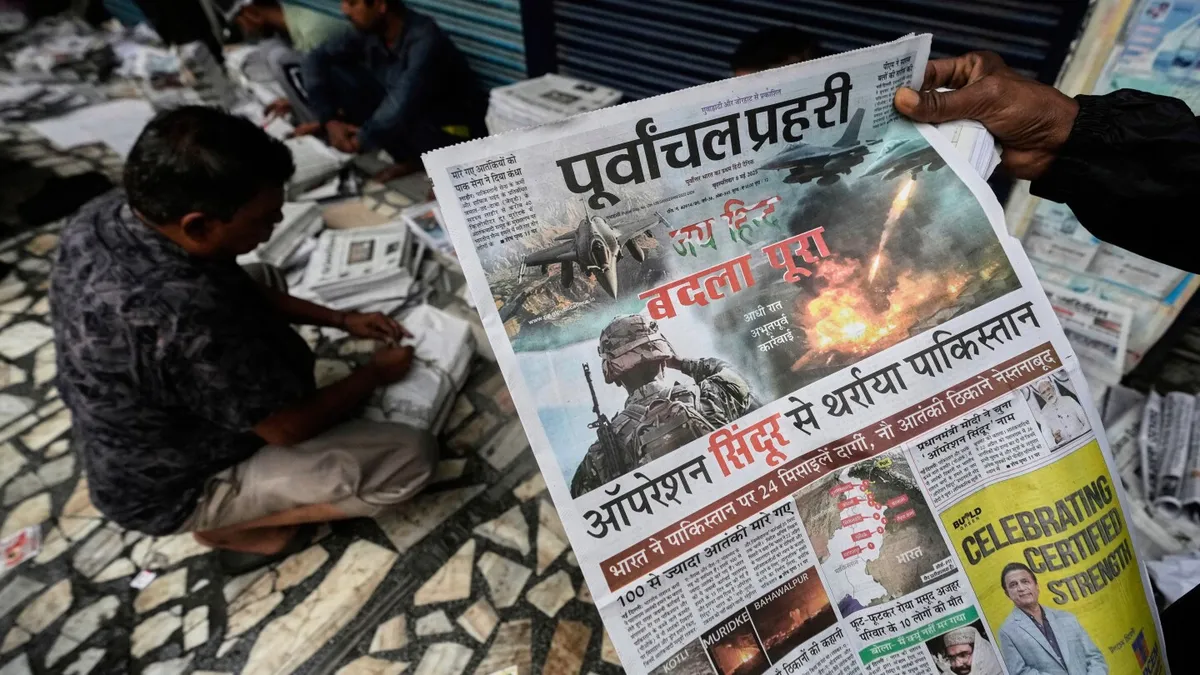
LAHORE, Pakistan (AP) — In a significant escalation of tensions between India and Pakistan, the Pakistani air defense system successfully intercepted and shot down a dozen Indian drones overnight. This incident comes in the wake of an Indian drone attack that targeted a military site near the eastern city of Lahore, resulting in injuries to four soldiers and causing some damage to the facility, according to military officials.
The drone strike follows a grim day for Pakistan, where Indian missile attacks resulted in the deaths of 31 civilians, including women and children. These developments have heightened concerns over the ongoing conflict in the region, particularly given the recent violence in Kashmir, which has seen increasing hostilities since April 22, when gunmen killed 26 individuals, primarily Indian Hindu tourists.
Lt. Gen. Ahmad Sharif, the spokesperson for Pakistan's army, confirmed that while the air defense system intercepted 12 Indian drones entering Pakistani airspace, one drone managed to inflict wounds on soldiers and cause damage to a military target. Additionally, debris from the downed drones fell in a populated area of southern Sindh province, resulting in one civilian fatality and another injury. The authenticity of these incidents has yet to be independently verified, and Indian officials have not responded to these claims.
In Lahore, local police official Mohammad Rizwan reported that one drone was shot down near Walton Airport, located approximately 25 kilometers (16 miles) from the Indian border. Local media also indicated that two additional drones were downed in other cities within Punjab province, the capital of which is Lahore. Notably, in the Chakwal district of Punjab, a drone crashed into farmland, although no casualties were reported. Local authorities have secured the wreckage for investigation into the drone's origin and purpose.
In response to these incidents, Indian officials stated that their strikes on Wednesday targeted nine locations in Pakistan believed to be involved in planning terrorist activities against India. Most of the casualties from these strikes were reported in Punjab province.
Pakistan's Prime Minister Shehbaz Sharif vowed to seek justice for the killings, raising fears of a broader conflict between the two nuclear-armed nations. Meanwhile, in Indian-controlled Kashmir, tens of thousands of residents sought refuge in shelters as Indian authorities evacuated civilians from numerous villages near the highly militarized Line of Control. Reports indicate that some residents in border towns like Uri and Poonch left their homes voluntarily due to the escalating situation.
India's foreign ministry reported that 13 civilians were killed and 59 injured during cross-border exchanges of fire the previous day. Furthermore, an Indian soldier was confirmed dead due to shelling on Wednesday, underscoring the dire humanitarian impact of the ongoing conflict.
In an effort to mediate the escalating tensions, Iranian Foreign Minister Abbas Araghchi arrived in India’s capital earlier this week. He is scheduled to meet with Indian Foreign Minister Subrahmanyam Jaishankar to co-chair a joint forum focused on economic cooperation. Iran has expressed its willingness to facilitate dialogue between India and Pakistan, which may provide a potential pathway to de-escalation in the region.
As the situation continues to unfold, the international community watches closely, concerned about the potential for further conflict between these two neighboring nations. The need for diplomatic dialogue and resolution has never been more critical.